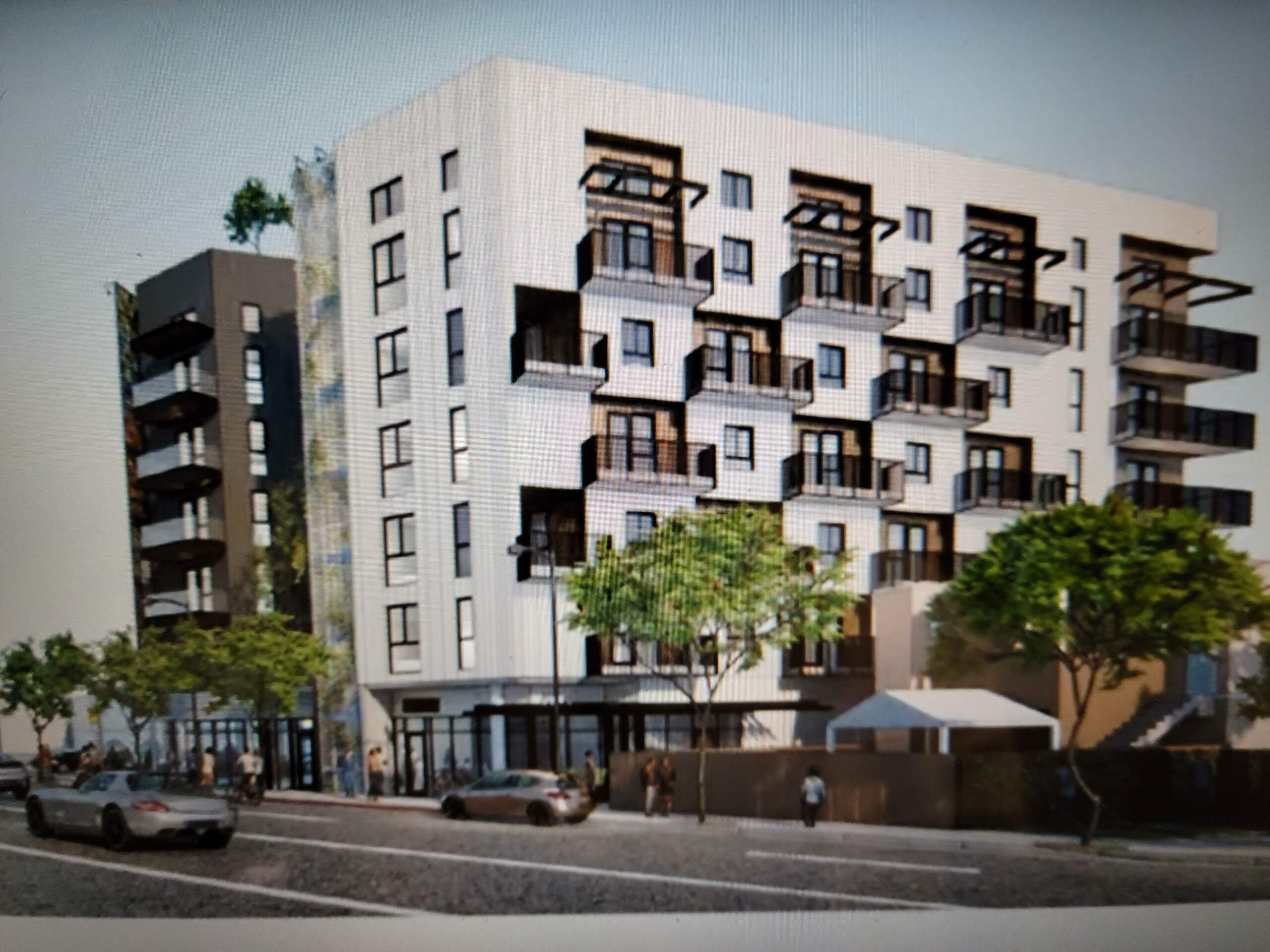On Monday evening, the West Hollywood City Council heard an appeal to a Planning Commission approval of a mixed-use development at 8500 Santa Monica Blvd, at the corner of La Cienega. The proposed building would come after the demolition of an existing, one-story commercial building and a billboard, and include, according to the staff report, “approximately 33,159 square-foot, six-story, mixed-use building containing 30 dwelling units above approximately 3,627 square feet of ground floor commercial space over a two-level subterranean garage with 31 parking spaces.”
There are several complaints, however, about the legitimacy of the project as approved. West Hollywood resident Allan Wilion submitted a lengthy memo making a number of allegations about what the Planning Commission approved, among them:
- The city violated procedural rules and processing rights related to noticing, public comment, and the provision of a staff memorandum regarding the project
- That it is illegal for the city to combine two lots that do not share a common border with a third lot in order to create the project site
- The density bonus and other incentives requested under the State Density Bonus Law are unprecedented
- The city approved an application that was so incomplete and did not comply with applicable development standards
But Doug Vu, who was presenting the item as a staff member with the city’s Current and Historic Development Planning Department, defended the city’s procedures. While acknowledging the staff report on this item identifies a defense of each allegation in detail, Vu summarized, stating, “The record demonstrates that the city complied with all applicable notice requirements,” and added that mailings and newspaper notices were used as well as other public notices. He added, “The city also maintains the conclusion that the inclusion of the two narrow strips of land as part of the project site as reasonable, supported by substantial evidence, consistent with the city’s municipal code, and is legal – as confirmed by L.A. County Public Works staff.”
Vu also explained the city is essentially obligated to grant a waiver request from portions of the State Density Bonus law so long as the request keeps the project on track toward being built. He also maintained that the Planning Commission approved an application that was complete.
Vu then informed the council that while the city stands by the application, the applicant itself wants to further amend the application. Through a morass of updates to the State Density Bonus Law that took effect this year, one of which shifts the burden of density bonuses to acreage over Floor to Area Ratio (FAR), the applicant would now feels empowered to remove one of the affordable housing units from the plan. Vu and the staff do not feel that certain amendments constitute a “new” project and concluded that the city council should therefore deny any appeal to the project.
Immediately there were questions from the council regarding the one fewer affordable unit and how that was calculated. When Councilmember Lauren Meister pointed out that the new amendment would take the affordability percentage of the building from 17 to 13 percent, she was corrected by saying that 10 units out of the 30 no longer count toward the affordability calculation because they qualified for the density bonus under updated law. Thus, four units out of 20 measured for that metric equals 20 percent.
But Meister didn’t relent. To the point of the amended plan meeting an “objective” housing standards, she asked, “Wouldn’t you say that our calculation for FAR and the components that we include in that, that’s been in our zoning code for all these years since State Density Bonus started, is objective?” Later, adding, “We didn’t have to give up that standard, did we, based on state law?” City Attorney Lauren Langer responded by essentially stating that the waivers and exceptions are granted to the applicant from a place of an objective standard, not prevented by one.
Mayor Pro Tem John Erickson directed his questions to staff on the consequences of granting the appeal, asking if the city might lose in court through the Housing Accountability Act (HAA) being cited, which, “prohibits a local agency from disapproving, or conditioning approval in a manner that renders infeasible, a housing development project for very low, low-, or moderate-income households or an emergency shelter unless the local agency makes specified written findings based upon substantial evidence in the record.” The staff did not want to speculate, and stated they needed to just focus on the project before the council tonight.
“But your staff report to us essentially insinuates that you cannot deny this project based off of the Housing Accountability Act, so, if you make that insinuation, you have to back it up with the claims for why,” Erickson politely shot back. He then criticized the staff report for not including enough about the HAA, saying it would have helped the public with their expectations coming into the meeting tonight.
Wilion, as the appellant, was the first of the public to speak, adamantly saying that as a matter of law, the entire discussion is moot given the applicants walked away from the project. He considers the staff’s actions an unlawful resurrection of a now defunct project. He claimed he wasn’t there to stop the development, but felt the procedure was shady and that he was trying to protect due process.
The applicants went next, with representative Elisa Paster countering, “We have not withdrawn our application from the planning commission; we have not abandoned our application, nor is there any law that would mandate that we do so or require that we do so.” She called the opponents of the project misguided about the city council’s authority to act on the appeal. “This is a De Novo Hearing,” she said. “That means you hear all the evidence in the record and any new evidence.” She added, “Your options on appeal aren’t simply to approve or deny. You can improve in part or deny in part.” She says that means the council could also add new requirements.
Mayor Sepi Shyne wasted no time asking Paster if the applicants would be willing to bump the number of affordable units back up to five. Paster said if it meant getting approval that night, they would be willing to add back the affordable unit but as a moderate-income unit.
The public comments that followed were largely concerned with the process and any precedent it would set to allow three non-adjoining parcels to be put together to create a development.
One resident, Cathy Blaivas, seemed truly saddened about the overall housing crisis, saying, “It’s a shame that in order to get the most affordable housing that is due, has to come through an appeal, and it has to come as a condition of going forward with this new project.” She added, “And I guess what I’m so tired of hearing, always – on the news, here in chambers, everywhere – is how tragic our housing shortage is. What’s tragic is the affordable housing, the workforce housing.” She cited previous councilmember John D’Amico saying, “We have no shortage of luxury housing.”
Former Councilmember Steve Martin suggested it go back to the Planning Commission, as did Wilion when he was invited to rebut the applicants.
City Attorney Langer assured the city council that each development decision is based on the facts of that decision found at the time and that just because one project was approved a certain way does not guarantee a future applicant precedent. But she added, “If you want to include some sort of language to make it clear that those elements are not precedent-setting, for the record, just so future applicants might realize that, I think we could probably come up with some language to include in a resolution.”
In council deliberation, Councilmember John Heilman said, “I don’t believe this is a new project that has to be refiled,” and later added, “There were changes in state law that the applicant took advantage of, which they are perfectly entitled to do under state law.”
“Rather than approving the appeal, which I think as our city attorney stated would indicate some sort of illegality of process, I would be in favor of adding that language upon passage as part of the resolution,” said Councilmember Chelsea Byers, speaking in favor of the project. Erickson said he was also comfortable adding the language suggested by the city attorney.
Mayor Shyne was also in support of what had been proposed by colleagues in addition to Meister’s suggested addition of wording on the FAR.
The council voted 5-0 to deny Wilion’s appeal and move the project forward.
Photo taken by the author
Stay informed. Sign up for The Westside Voice Newsletter
By clicking submit, you agree to share your email address with Westside Voice. We do not sell or share your information with anyone.








